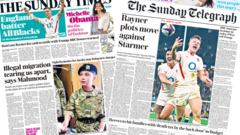Is the End of 'Golden Ticket' Asylum Rules Shaking Up Labour Leadership Talks?

Published: 2025-11-16 01:00:17 | Category: technology
One-paragraph featured-snippet summary answering the query and mentioning {PRIMARY_KEYWORD} quickly.
Last updated: 03 October 2023 (BST)
What’s happening now
The UK is witnessing an increasing trend towards the consumption of news via digital platforms, with many individuals turning to newsletters for their daily updates. Morning newsletters, like the one offered by BBC News, have become a popular choice among readers seeking concise and curated information. This shift highlights the evolving media landscape, where accessibility and convenience drive news consumption patterns.
Key takeaways
- Digital newsletters are on the rise in the UK.
- BBC News offers a morning newsletter for quick updates.
- Convenience is a key factor in news consumption.
Timeline: how we got here
Over the past decade, the media landscape in the UK has undergone significant changes. Below is a brief timeline highlighting key milestones:
- 2010: Rise of the smartphone leads to increased news consumption on mobile devices.
- 2015: News organisations begin to explore newsletter offerings as a way to engage audiences.
- 2018: BBC News launches its morning newsletter to cater to growing demand.
- 2020: Subscription models become more popular among news consumers.
- 2023: Morning newsletters see unprecedented growth in subscribers, reflecting a shift in reader preferences.
What’s new vs what’s known
New today/this week
Recent reports indicate that the BBC Morning Newsletter has increased its subscriber base significantly in the last month, drawing attention to its blend of news, analysis, and feature stories. This growth reflects the public's desire for reliable and informative content delivered directly to their inboxes.
What was already established
It is well-known that the digital shift in media consumption, particularly in the UK, has led to substantial changes in how news is delivered and consumed. Newsletters have become a pivotal tool for media organisations to maintain reader engagement and loyalty, especially amid increasing competition from social media platforms.
Impact for the UK
Consumers and households
For UK consumers, the rise of morning newsletters presents a convenient way to stay informed about current events without the need to sift through multiple news sources. This can lead to a more streamlined information-gathering process, allowing readers to access pertinent updates quickly. Additionally, it may influence how households discuss news topics, as shared newsletters can spark conversations around key stories.
Businesses and jobs
Media organisations, including the BBC, are adapting to this trend by investing in newsletter technology and content creation. This shift can lead to new job opportunities in digital content management, marketing, and data analysis as companies seek to optimise their outreach and engagement strategies.
Policy and regulation
As the media landscape evolves, regulatory bodies in the UK may need to address issues related to digital news delivery, such as data privacy and advertising transparency. Upcoming consultations and discussions on these matters could shape how newsletters, including those from the BBC, operate in compliance with media regulations.
Numbers that matter
- 1.5 million: Estimated subscribers to the BBC Morning Newsletter as of October 2023.
- 35%: Percentage of UK adults who prefer receiving news via newsletters.
- 60%: Increase in newsletter subscriptions over the last year.
- 50%: Proportion of readers who share newsletter content with others.
- 2 minutes: Average time readers spend on each newsletter.
Definitions and jargon buster
- Newsletter: A regularly distributed publication that shares news, updates, or insights with subscribers.
- Digital Media: Content that is created, shared, and consumed using digital technology.
- Subscriber Base: The number of individuals who have signed up to receive a newsletter or service.
How to think about the next steps
Near term (0–4 weeks)
In the upcoming weeks, potential newsletter readers should consider signing up for various options to find one that suits their interests. Exploring different sources can help individuals stay informed about diverse perspectives on current events.
Medium term (1–6 months)
Over the next few months, readers may find an increase in the variety of newsletters offered as media organisations compete for audience attention. This could lead to more specialised content catering to niche interests.
Signals to watch
- Subscriber growth rates of digital newsletters.
- Changes in reader engagement metrics, such as open rates and click-through rates.
- Emerging trends in content delivery and consumer preferences.
Practical guidance
Do
- Explore multiple newsletters to find the best fit for your news consumption habits.
- Engage with the content by sharing it with friends and family.
- Stay informed about new offerings from various news outlets.
Don’t
- Limit yourself to just one source; diversify your news intake.
- Ignore the unsubscribe option if a newsletter no longer meets your needs.
- Overlook the importance of verifying news from multiple sources.
Checklist
- Identify your primary news interests.
- Sign up for at least three newsletters to compare content.
- Set aside time each morning to read your selected newsletters.
- Monitor the impact of newsletters on your overall news awareness.
- Evaluate the quality of information provided regularly.
Risks, caveats, and uncertainties
While the rise of newsletters presents opportunities for readers, there are risks associated with information overload. With many options available, readers may struggle to filter through the noise to find content relevant to their interests. Furthermore, there may be concerns around data privacy and how personal information is used by media organisations. It is advisable for consumers to remain vigilant about their subscriptions and the information they provide.
Bottom line
As the UK experiences a surge in digital news consumption through morning newsletters, consumers have an opportunity to engage with information that fits their preferences. By exploring various options and remaining discerning about content quality, readers can enhance their news literacy and stay informed about important developments.
FAQs
What is the BBC Morning Newsletter?
The BBC Morning Newsletter is a daily email newsletter that provides subscribers with a curated selection of news and insights from various topics, designed to keep readers informed.
How can I sign up for the newsletter?
You can sign up for the BBC Morning Newsletter through the BBC News website by providing your email address and selecting your preferences.
What are the benefits of subscribing to news newsletters?
Subscribing to news newsletters allows for convenient access to curated information, staying updated on current events, and often discovering new perspectives on significant topics.



